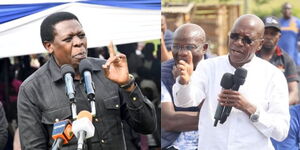Juja Member of Parliament George Koimburi is facing a myriad of devastating consequences after the Directorate of Criminal Investigations (DCI) revealed on Wednesday, May 28 that the lawmaker staged his own disappearance.
While addressing the media, Inspector General of Police Douglas Kanja, flanked by other senior police bosses, including the director of the Directorate of Criminal Investigations (DCI) Amin Mohammed, revealed that police have arrested three people, including the Juja CDF chairperson, who allegedly collaborated in carrying out the kidnapping.
Statements issued by the suspects after the arrests have unravelled what happened to the MP, with authorities now convinced the disappearance and alleged torture were stage-managed.
This new development could come at a hefty cost for Koimburi, who could potentially lose his freedom, credibility, money, and, in the worst-case scenario, his seat.
Legally speaking, the Office of the Director of Public Prosecutions (ODPP) could take up the matter after the DCI concludes investigations, and if sufficient evidence is provided, Koimburi could face criminal charges, including giving false information to the police, obstruction of justice, and misuse of public resources.
Based on the staged disappearance claims alone, the Ethics and Anti-Corruption Commission (EACC) also has grounds to intervene. If Koimburi is found to have deliberately misled the public or authorities, the EACC can initiate investigations and recommend disciplinary action, purely based on Chapter 6 of the Constitution, which focuses on promoting good governance through leadership and integrity.
While the EACC cannot directly remove a Member of Parliament, findings can be forwarded to the ODPP. Proceedings can also be filed in court if Koimburi is deemed unfit to serve under the provisions of Chapter 6 of the Constitution.
Parliament also has internal mechanisms to address an MP’s misconduct through the Powers and Privileges Committee, which is chaired by National Assembly Speaker Moses Wetang’ula.
Through this committee, Koimburi can be investigated, and should his conduct be deemed inappropriate or damaging to the image of the National Assembly, the committee can summon him, conduct inquiries, and recommend appropriate action against the lawmaker.
Punishment from the Powers and Privileges Committee can include suspension, reprimand, or, in the worst case, a referral for further investigations.
Finally, outside institutional repercussions, Koimburi could also be held accountable on the ground by his own constituents. The Constitution gives citizens the right to recall their Member of Parliament at the end of his term in a process that can be triggered if the lawmaker is found guilty of gross misconduct or violates leadership and integrity provisions.
A recall can be initiated by any ordinary Juja resident, who must file a petition with the Independent Electoral and Boundaries Commission (IEBC) alongside signatures of 30 per cent of registered voters in the constituency.
If IEBC approves the petition, a recall referendum will be held, and if the majority supports the call, the MP can be removed, and a by-election will follow.












